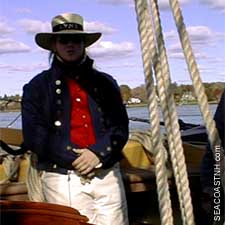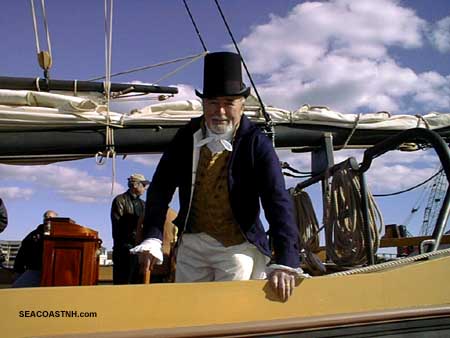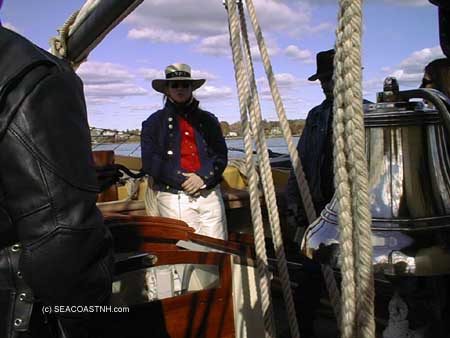|
FRESH STUFF DAILY |
|
|
||
|
|
||
|
|
||
|
SEE ALL SIGNED BOOKS by J. Dennis Robinson click here |
||
Portsmouth is Portsmouth becuase of its privateering history. Some of the city's finest homes were and largest fortunes were made by legalized piracy in wars against Britain. Here Brewster names names of both ships and men in this highly informative essay.
PRATEERING IN PORTSMOUTH, NEW HAMPSHIRE Editors Note: C.W. Brewster was a Portsmouth, New Hampshire columnist and editor in the early to mid-1800's. This article includes his opinions and may not reflect current research or current values. From Brewster’s Rambles About Portsmouth, 1869 exclusively on SeacoastNH.com. – JDR RAMBLE CXXXIV. OUR wharves afford a depth of water sufficient to float the first class ships at low tide without grounding. Church hill is on a bluff of perhaps forty feet above the water. In former times there were no buildings on the north end of Chapel street -- and where Deacon Day's store and house was afterwards built, and west of it, there was an abrupt precipice open by the road side down to the river. It was about the year 1790 that Stephen, the only son of John Greenleaf, the keeper of the Bell Tavern, was riding with full speed in a sleigh from Chapel into Bow street, when the sleigh slid round over the precipice and down went the horse, sleigh and rider! Our informant was present, and saw the horse taken up at the market. Strange to say, nobody was hurt. We shudder as we now look at the place. At the present day we do not see the busy wharves, the fleets of West Indiamen, the great piles of bags of coffee, and the acres of hogsheads of molasses which we used to see; nor do we see Water street crowded with sailors, and the piles of lumber and cases of fish going on board the West Indiamen for uses in the Tropics. But if that day is gone by, we have other occupations, and the old town seems as bright and handsome as ever. The following will recall to our elder men a glimpse of the stirring scenes which some of our people had a part in at no very remote day, -- and yet how few can say they "freshly remember" them! Here we are, in the ever memorable year 1812, standing on the old wharf at Point of Graves, beholding the first privateer fitting out after the declaration of war. That schooner is the Nancy, and that man with two pistols in his belt, and his vest pockets filled with loose gunpowder, is Captain Smart. There is a large company or spectators on the wharf looking at the little craft. But off she goes to the mouth of the St.Lawrence, and like a small spider entrapping a bumble-bee, she soon returns with her prize. In the last war with England, Privateering was a great pursuit. The Privateer Portsmouth of Portsmouth was a conspicuous cruising vessel. She was commanded by John Sinclair and made a great many valuable prizes. His widow, a very respectable lady, was still living and resided in Brooklyn, New York, in 1856.
The following are among the Privateers belonging to Portsmouth in the war of 1812: Fox; Capts. Handy and Brown The "Harpy" hailed from Baltimore -- but sailed one if not two cruises from Portsmouth. The Harlequin was a promising craft, and among her crew were several who had been ship masters. She was aiming for great returns. They had been out but a short time, when a noble ship hove in sight. The Harlequin bore down upon her, and when at a near approach the port holes of the enemy were thrown open, they played the Harlequin no longer. The prize, which took them, proved to be the Bulwark of 74 guns! If any apology is necessary for men fighting against the common enemy "on their own hook," it may be found perhaps in the great disparity of forces of the contending powers. The British fleet comprised 1060 men-of-war, of which 800 were in commission. The American navy had seven effective frigates, and 12 or 15 sloops-of-war! The disparity is absolutely ludicrous, and yet what glory was acquired by our gallant navy! The fights of the Constitution, the Essex, the Enterprise and their noble compeers, quite eclipsed in history the deeds of daring performed by the Fox, the Portsmouth, the Gen. Armstrong, the Decatur, the young Wasp, the Yankee, the Teazer, the Rolla, the Globe, and a hundred others. But in the story of man's boldness and bravery, nothing excels the deeds of the American Privateers, in the war of 1812. The record, however, so far as we know, is very slight. There was published in New York in 1856, a crude and skeleton sketch of them, entitled "History of the American Privateers and Letters of Marque," &c. by George Coggeshall, captain of a Privateer. We well recollect, Capt. Tom Shaw as well as Capt. Elihu D. Brown, who led two "private armed" ships against the commerce of Great Britain. No doubt our readers will be interested in the following extracts of the work referred to. The book is a valuable addition to the History of the United States, though compiled by an old sailor of 72 years of age from such materials as he could command. Cooper's Naval History perhaps has something on the subject, but we know of no other History of the American Privateers, -- an ample detail of their wonderful and romantic daring, bearding the British Lion in his den, and capturing his ships on every sea, has yet to be written. The affair of the General Armstrong, Capt. Reid, which was attacked in the harbor of Fayal by two or three British men-of-war, has been before Congress within a few years for indemnity. The enemy lost more men in their attempt to capture her, than in some actions where fleets were engaged. She was scuttled by her own crew.
These private armed vessels appear to have carried almost invariably a "Long Tom," and besides, from 2 to 18 guns, and from 50 to 150 men. New York had 26 afloat, scouring the seas, Baltimore 18, at one time, in the early part of the war; while Newport, Charleston, Boston, Newburyport Bristol, New London, Salem, Portsmouth and other ports had their share. They were commissioned by the United States "to take, burn, sink and destroy the enemy wherever he could be found, either on the high seas or in British Ports." But the object of this article is merely to give Portsmouth as recorded. 1812,-- Ship Richmond, 14 guns, 25 men besides officers, 400 tons, deeply laden with W. India produce, worth $200,000, was captured on a voyage from Jamaica to London, and sent into Portsmouth by the Privateer Thomas. Ship Falmouth, 14 guns, 30 men, from Jamaica for Bristol, (E.) with a cargo valued at $200,000, was captured by the Thomas of this Port and sent into Portsmouth, Aug. 18, 1812. The privateer sch. Thomas, Capt Shaw, 11 guns and 100 men, and Privateer sloop Science, Fernald, sailed from this port on a cruise. Two other Privateers were fitting out at the same time. Sch. Phoebus and Phebe sent into Portsmouth by the Squando of that Port. The Squando was only a pink stern schooner. The English brig Resolution arrived at Portland a prize to the privateer Nancy of Portsmouth. Barque Fisher from Rio with a very valuable cargo and considerable spice was sent into Portland by the Fox of Portsmouth. 1813-Brig Mars, from Jamaica for Halifax, sent into Portsmouth by the Fox. [This was afterwards the privateer Mars.] Ship Dromo, 12 guns, from Liverpool for Halifax, with a cargo valued at $70,000, was sent into Wiscasset by the Thomas, of Portsmouth. A Brig sent into Boothbay by the same, with a very valuable cargo. It is said these two vessels produced the captors more than $500,000. A Brig was sent into Portsmouth by the Gov. Plumer of this port. A Brig was captured and burnt by the Gov. Plumer -- she was bound from Hull to Halifax. Brig Daniel from Waterford to Halifax, laden with provisions, sent into Portsmouth by the Gov. Plumer, privateer. The noted schr. Liverpool Packet of -- guns, carried into Portsmouth by the Thomas of that port. Afterwards fitted as a Privateer called the the Liverpool Packet, Capt.Watson. Brig Nelly, Cork, for Newfoundland, captured by the Fox of Portsmouth, and burnt after disposing of her valuable articles. Sloop Peggy, Greenwhich, for Limerick, captured by the same and Sch. Brother and Sister, captured by the same and burnt. Brig Louisa, captured by the Fox and ransomed. Sloop Fox, from Liverpool, for Limerick, valuable, captured by the Privateer Fox and sent to Norway. (4 more prizes are recorded in this chapter to the Fox, but there was another of the same name from Baltimore, and she may have been the vessel.) But we grow weary of the task. This was only the first year of the war. The oceans of the world swarmed, literally swarmed, with Privateers, and British ships were captured by hundreds. Our own merchant ships were cooped up at home, not daring to face the gauntlet of the British naval forces. The sailors who should have manned them, turned privateersmen, and thus the war was waged till the Peace of 1815. We still in imagination see our streets filled with jolly privateersmen men in groups, with blue ribbons tied around their hats inscribed in large letters "SUCCESS TO THE FOX," or whatever vessel they were to sail in. And then another scence, of the sailors paid off, with so much money that they knew not what to do with it. It was one of these men who one day near Matket Square, put his arm round the neck of a cow, kissed her, and put a five dollar bill in her mouth for a cud. They might be seen, too, sporting their parasols, and in dresses most ludicrously fine. Some men grew rich by the war -- they piled thousands upon thousands -- but now, ere half a century has passed away, scarcely any mark of the riches obtained by privateering, is visible in their families. Their mansions have generally passed into other hands, and their descendants are many of them poverty stricken. If Solomon's proverbs on fleeting riches had not been written earlier, they might have been based on the results of our privateering acquisitions. Text scanned courtesy of The Brewster Family Network Please visit these SeacoastNH.com ad partners.
News about Portsmouth from Fosters.com |
| Thursday, April 18, 2024 |


|
Copyright ® 1996-2020 SeacoastNH.com. All rights reserved. Privacy Statement
Site maintained by ad-cetera graphics

 Smuttynose Murders
Smuttynose Murders





















